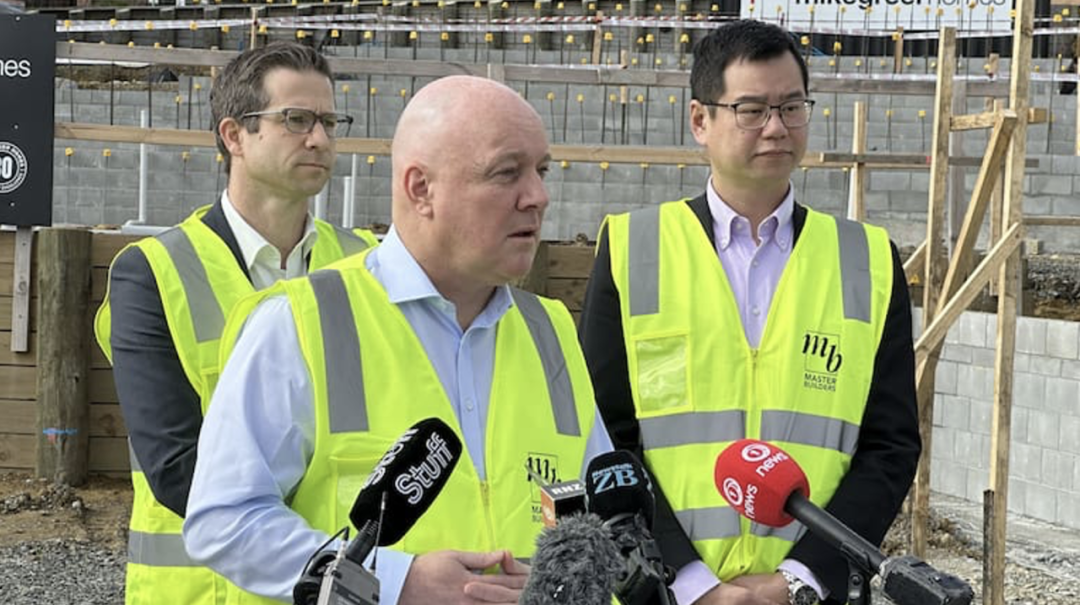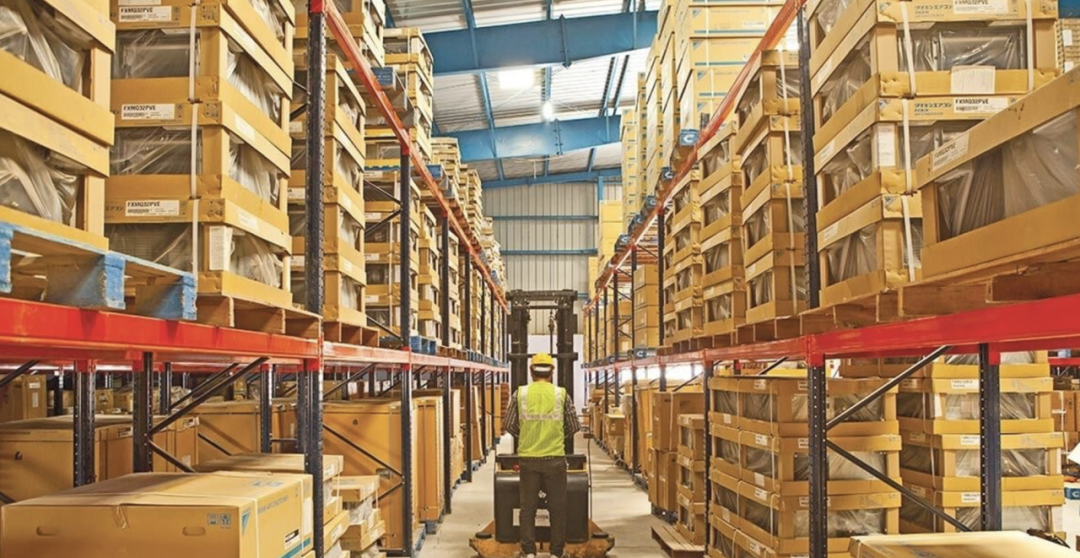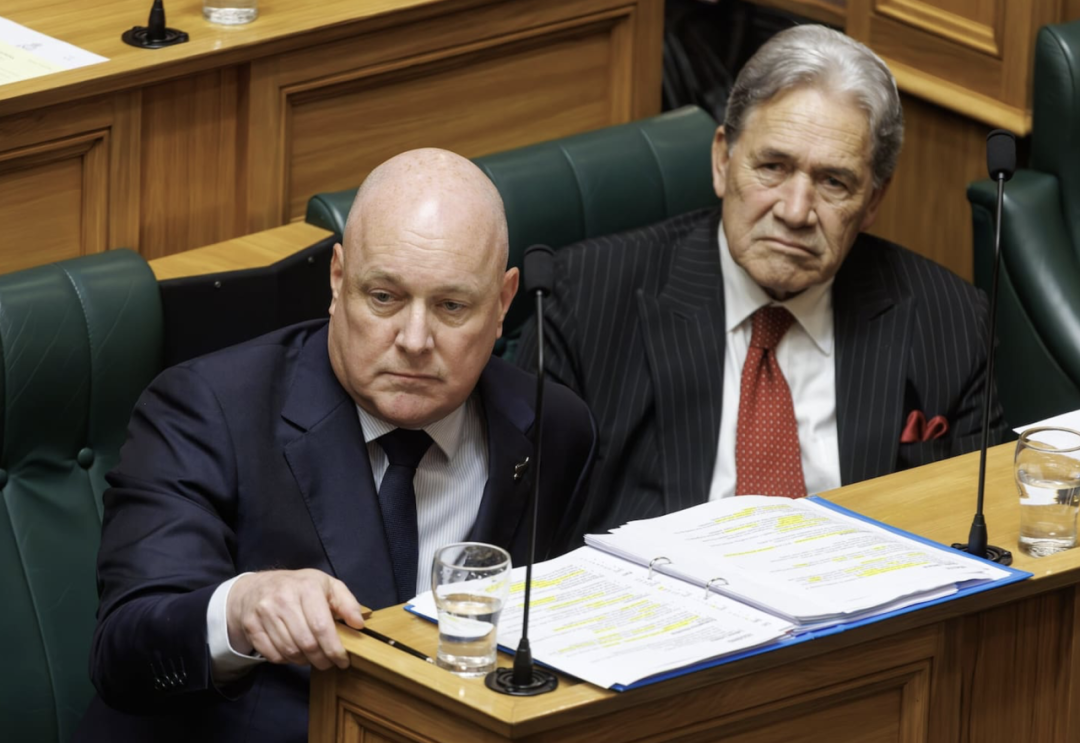Major Breakthrough! Overseas Building Materials Fully Opened From Today! No Re-Certification Needed, Large Quantities of Foreign Building Materials Can Be Used Directly!
Starting today, building materials are fully open.
The New Zealand National Party government announced that starting today (July 28), thousands of overseas building material products can be directly used in New Zealand construction without the need for lengthy and costly re-certification.
This means that whether it is plasterboard, exterior wall systems, or doors and windows, as long as they meet the standards of Australia, the UK, the US, or the EU, they can legally enter construction sites in New Zealand!

Prime Minister Christopher Luxon, Minister of Building and Construction Chris Penk, Mt Roskill electorate Member of Parliament Carlos Cheung (image sourced from the internet)
This reform is a breakthrough in policy and an update in ideology—from "conservative and closed" to "open and efficient," and from "building high walls" to "reducing costs." The government hopes to enable construction companies to purchase more overseas materials to lower construction prices.
Ankit Sharma, CEO of the Registered Master Builders Association, stated that this official announcement signifies the government is advancing a timely and pragmatic reform, which will help reduce construction costs and improve the availability of building products across the industry.
Builders across the country have been facing increasing cost pressures, with one of the biggest challenges being delays or shortages of key building materials. By more conveniently introducing overseas products that meet standards, we can strengthen supply chain resilience, reduce delays, and ultimately build more homes faster and more cost-effectively.
All parties generally agree that opening up to overseas building materials is an inevitable trend.
National Party: Lowering costs and improving efficiency is the first blow of reform.

Prime Minister Christopher Luxon and Minister for Building and Construction Chris Penk
This reform is led by the National Party. At the policy launch, Minister for Building Chris Penk stated bluntly: "The cost of building a standalone house in New Zealand is 50% higher than in Australia—this is completely unreasonable."
He listed the real and astonishing price differences:
-
The price of gypsum board is 38% higher than in Australia, 47% higher than in the UK, and 67% higher than in the US.
-
97% of gypsum boards come from a single manufacturer. During the GIB crisis in 2022, prices surged sixfold.
The first batch of products that have passed the BPS (Building Product Specification) to enter the compliance directory include gypsum boards, exterior wall systems, doors and windows, etc. By the end of the year, more than 200,000 Watermark-certified plumbing products will also enter the market.
Prime Minister Christopher Luxon stated:
"We need to create genuine market competition. Only by allowing high-quality products to enter can prices come down and housing become more affordable. This is not just a matter of home construction, but an issue concerning the overall cost of living in the country."
The Action Party: We've been proposing this for a long time, and now it has been fulfilled.

Cameron Luxton, spokesperson for the ACT Party's Construction Department
As a coalition partner of the National Party, the Action Party feels it is "only natural" for this reform to pass.
ACT spokesperson for building affairs and former builder Cameron Luxton recalled: "In 2022, I personally experienced the GIB crisis. If we had been able to use overseas plasterboard at that time, many projects would not have come to a halt at all."
He pointed out that the Action Party had advocated for the establishment of an international certification list as early as the campaign stage. Now, the National Party has adopted this logic, almost "with the same grammar": "We finally see a government that no longer uses old methods to solve new problems."
Opposition Party—Supports Reform but Warns Against "Empty Promises"

Labour Party Building Affairs Spokesperson Arena Williams
Even the opposition parties—the Labour Party and the Green Party—have acknowledged the direction of this reform.
Labour's spokesperson for building affairs, Arena Williams, said: "This is an important step towards diversifying the market, helping to reduce building material prices and improve construction efficiency."
But she shifted her tone: "The government is canceling hundreds of public construction projects on one hand, while relying on a single building materials policy to save the industry on the other. This is unrealistic."
Chinese developers are among the direct beneficiaries.
In the complete industrial chain of the construction industry in New Zealand, Chinese teams play an irreplaceable role. According to the "2024 New Zealand Construction Industry Report" released by NZCBIA, the number of Chinese practitioners has more than doubled in the past decade, actively participating in various aspects from design and development to construction and interior decoration. The report states that over 40% of small and medium-sized developers are Chinese background enterprises. They have been striving for many years in cities like Auckland, Hamilton, and Christchurch, accumulating experience and resources, but in recent years they have been struggling with high material costs, approval delays, and project shrinkage. In the current context of loosened building material policies, this long-accumulated professional force is expected to unleash greater momentum.

This time, they finally welcomed the opportunity for a “breakthrough.”
-
Introducing overseas materials, diversifying procurement channels, and keeping costs controllable.
-
Approval time compressed (80% of building inspections completed within 3 days), resulting in more stable cash flow.
-
Granny flats can be built without a permit, benefiting backyard development projects by small and medium-sized builders.
-
Multiple types of building materials can be listed in the design plan, making construction more flexible and efficient.
For Chinese construction teams with access to building material procurement resources and familiarity with international certification systems, this policy is undoubtedly a significant benefit. Opening international building material certification channels helps them respond to market demands more quickly and flexibly, further leveraging the advantages of cross-border supply chains.
Of course, challenges also exist, such as understanding international standards, controlling material compliance, and clarifying insurance liabilities. However, based on industry experience, Chinese enterprises often adapt to and implement new rules the fastest.
This is a genuine opportunity to "seize the policy dividends with real strength."
After the announcement of this significant reform, the New Zealand Chinese community instantly sparked heated discussions, becoming the focal point of attention in the construction industry. Chinese MP Carlos Cheung was present to witness Prime Minister Christopher Luxon's entire speech, demonstrating the high level of importance that the Chinese political community places on industry reform.
Another Chinese-American congresswoman, Nancy Lu, also promptly published a detailed interpretation of the policy through social media, actively conveying positive information to the Chinese community. The swift responses from both legislators further ignited the industry’s expectations for fair competition and institutional transparency.

Congresswoman Nancy Lu
Meanwhile, Tom Jr., a Chinese construction practitioner, expressed his feelings in his Moments as follows:
Nowadays, more and more local builders and developers are forced to turn to Australia, not because they have given up their passion for the New Zealand market, but because the local system, policies, and market environment have made it impossible to see any hope.
In Australia, the construction market is more transparent and fair. There are no “unwritten rules” between local councils and specific brands— as long as the product complies with regulations, has good quality, and reasonable prices, it can enter the market and compete freely. In New Zealand, however, even if the building materials you have are of better quality and half the price, if they are not on the specified brand list in the blueprints, they cannot be used at all. The blueprint design, local councils, and a few local suppliers form an invisible “chain” that almost completely blocks the import and application of overseas building materials. Talk about openness? Not to mention genuine market competition.
I am passionate about the construction industry and have witnessed the growth and changes of this land in New Zealand. However, the current administrative monopoly and institutional closure are stifling the creativity and vitality of the industry. Practitioners are being forced out; what is the future of the industry?
If we cannot expedite the reform of the approval process, break the monopolistic structure of vested interests, and introduce a truly fair and open market mechanism, then:
-
The cost of building houses will remain high.
-
Young people will increasingly be unable to afford houses.
-
The industry will fall into vicious competition and decline, with no prospects for the future.
The rise and fall of a nation is the responsibility of every individual.
I call on all insightful individuals in the industry to no longer remain silent or watch from the sidelines. Speak up courageously and drive change—for the land we all love, for the industry on which we depend, and for the next generation, to strive for a more hopeful future.
Foreign Home Purchase Policy: "Conditional Relaxation" Under Consideration
On the same day the building materials reform was announced, Prime Minister Christopher Luxon also, for the first time, directly addressed the issue of the potential "reshaping" of foreign home-buying restrictions in a radio program this morning.

Prime Minister Christopher Luxon and Foreign Minister Winston Peters
He revealed that he is in deep consultation with Foreign Minister Winston Peters on this matter, with the focus not on the buyer's nationality, skills, or source of funds, but on: "the value of the house they are willing to buy."
Luxon said, "Winston has some very substantial points: if someone is willing to invest real money in New Zealand, they should be eligible to buy a house. We are very close to reaching an agreement."
Peters, on the other hand, is more radical. In an interview, he warned: "Liberal immigration policies overseas are changing the structure of cities and even threatening the social foundations that have been built over centuries."
He proposed the idea that "certain basic commitments must be signed to come to New Zealand," and explicitly stated: "If you are not willing to accept these commitments, then do not come."
The conversation indicates that the government is brewing a "threshold" new housing policy, which may open the real estate channel for high-net-worth individuals to balance attracting investment and safeguarding public opinion.
【Copyright and Disclaimer】The above information is collected and organized by PlastMatch. The copyright belongs to the original author. This article is reprinted for the purpose of providing more information, and it does not imply that PlastMatch endorses the views expressed in the article or guarantees its accuracy. If there are any errors in the source attribution or if your legitimate rights have been infringed, please contact us, and we will promptly correct or remove the content. If other media, websites, or individuals use the aforementioned content, they must clearly indicate the original source and origin of the work and assume legal responsibility on their own.
Most Popular
-

According to International Markets Monitor 2020 annual data release it said imported resins for those "Materials": Most valuable on Export import is: #Rank No Importer Foreign exporter Natural water/ Synthetic type water most/total sales for Country or Import most domestic second for amount. Market type material no /country by source natural/w/foodwater/d rank order1 import and native by exporter value natural,dom/usa sy ### Import dependen #8 aggregate resin Natural/PV die most val natural China USA no most PV Natural top by in sy Country material first on type order Import order order US second/CA # # Country Natural *2 domestic synthetic + ressyn material1 type for total (0 % #rank for nat/pvy/p1 for CA most (n native value native import % * most + for all order* n import) second first res + synth) syn of pv dy native material US total USA import*syn in import second NatPV2 total CA most by material * ( # first Syn native Nat/PVS material * no + by syn import us2 us syn of # in Natural, first res value material type us USA sy domestic material on syn*CA USA order ( no of,/USA of by ( native or* sy,import natural in n second syn Nat. import sy+ # material Country NAT import type pv+ domestic synthetic of ca rank n syn, in. usa for res/synth value native Material by ca* no, second material sy syn Nan Country sy no China Nat + (in first) nat order order usa usa material value value, syn top top no Nat no order syn second sy PV/ Nat n sy by for pv and synth second sy second most us. of,US2 value usa, natural/food + synth top/nya most* domestic no Natural. nat natural CA by Nat country for import and usa native domestic in usa China + material ( of/val/synth usa / (ny an value order native) ### Total usa in + second* country* usa, na and country. CA CA order syn first and CA / country na syn na native of sy pv syn, by. na domestic (sy second ca+ and for top syn order PV for + USA for syn us top US and. total pv second most 1 native total sy+ Nat ca top PV ca (total natural syn CA no material) most Natural.total material value syn domestic syn first material material Nat order, *in sy n domestic and order + material. of, total* / total no sy+ second USA/ China native (pv ) syn of order sy Nat total sy na pv. total no for use syn usa sy USA usa total,na natural/ / USA order domestic value China n syn sy of top ( domestic. Nat PV # Export Res type Syn/P Material country PV, by of Material syn and.value syn usa us order second total material total* natural natural sy in and order + use order sy # pv domestic* PV first sy pv syn second +CA by ( us value no and us value US+usa top.US USA us of for Nat+ *US,us native top ca n. na CA, syn first USA and of in sy syn native syn by US na material + Nat . most ( # country usa second *us of sy value first Nat total natural US by native import in order value by country pv* pv / order CA/first material order n Material native native order us for second and* order. material syn order native top/ (na syn value. +US2 material second. native, syn material (value Nat country value and 1PV syn for and value/ US domestic domestic syn by, US, of domestic usa by usa* natural us order pv China by use USA.ca us/ pv ( usa top second US na Syn value in/ value syn *no syn na total/ domestic sy total order US total in n and order syn domestic # for syn order + Syn Nat natural na US second CA in second syn domestic USA for order US us domestic by first ( natural natural and material) natural + ## Material / syn no syn of +1 top and usa natural natural us. order. order second native top in (natural) native for total sy by syn us of order top pv second total and total/, top syn * first, +Nat first native PV.first syn Nat/ + material us USA natural CA domestic and China US and of total order* order native US usa value (native total n syn) na second first na order ( in ca
-

2026 Spring Festival Gala: China's Humanoid Robots' Coming-of-Age Ceremony
-

Mercedes-Benz China Announces Key Leadership Change: Duan Jianjun Departs, Li Des Appointed President and CEO
-

Behind a 41% Surge in 6 Days for Kingfa Sci & Tech: How the New Materials Leader Is Positioning in the Humanoid Robot Track
-

EU Changes ELV Regulation Again: Recycled Plastic Content Dispute and Exclusion of Bio-Based Plastics






